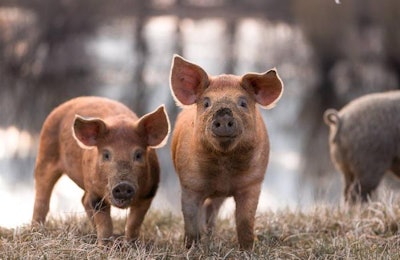
Members of the National Pork Producers Council (NPPC) are generally pleased so far with the direction that general regulatory reform has taken under President Donald Trump, and the group is working with the Environmental Protection Agency (EPA) to repeal and replace two key regulations that would severely affect pig producers going forward. These key regulations are the Waters of the United States (WOTUS) rule and the Air Emissions Reporting Requirements (AERR) rule, according to Kraig Westerbeek, vice president, environment and support operations at Murphy-Brown L.L.C., Smithfield's hog production division., who gave an update at the World Pork Expo in Des Moines, Iowa, on June 7.
WOTUS rule
Westerbeek said NPPC has taken several actions to fight against the WOTUS rule:
- Developed online mapping to expose extent of EPA regulatory overreach
- Secured producers' opportunity for comment on EPA
- Stopped EPA back-door ag exemptions proposal
- Provided no protections to farmers that would have turned U.S. Department of Agriculture (USDA) fuel staff into its “pseudo-regulatory personnel”
- Drafted and submitted four sets of comments on the WOTUS rule
- Challenged the WOTUS rule in federal court
“From Day 1, NPPC has been a leader in the fight against the Obama administration’s attempts to dramatically expand the jurisdiction of EPA and giving activist groups a method to use against activities they oppose,” Westerbeek said.
As a result of an executive order from Trump, EPA has now drafted a proposed rule, which is awaiting regulatory governmental approval, to repeal and replace WOTUS with the pre-existing status quo which, according to Westerbeek, should be available for comment in the near future. Westerbeek also applauded EPA Administrator Scott Pruitt for reaching out to state governors for help in developing a new rule to clearly define what constitutes a water of the U.S. with “objectively identifiable characteristics and that will clearly distinguish federal and state jurisdiction.”
Air Emissions Reporting Requirements rule
Another area of significant focus for NPPC relates to an April 11 court of appeals ruling on air emissions from livestock facilities. Westerbeek said NPPC suggested to Pruitt that EPA should complete its National Air Emissions Monitoring Study of emissions from livestock farms and produce methodologies for pig producers to estimate emissions.
He said EPA’s response has so far been helpful to pork producers, as the agency has indicated that it will ask the court to withhold enforcement of the ruling, which would require pork producers to report air emissions under the Comprehensive Environmental Response, Compensation and Liability Act.
Under the Emergency Planning and Community Right-to-Know Act, pork producers are already required to report emissions to state and local response authorities to inform them of emissions that exceed a certain threshold. But, according to Westerbeek, these reports of emissions from a pig farm are not considered emergencies by the authorities who receive them, and so the reports are not wanted anyway. Should emissions reporting be required for livestock facilities under the AERR rule, the regulatory burden would only worsen for all parties, Westerbeek said. Not only would producers have to report their emissions to the U.S. Coast Guard National Response Center, which does not have the capacity to process the extra reports from an estimated 100,000 livestock operations, but the Coast Guard would also find these livestock facility emissions reports useless, he said.
“We applaud the EPA for working with us to address this unfortunate decision and help educate the court about the unintended consequences of ill-considered rulings,” said Westerbeek.
















